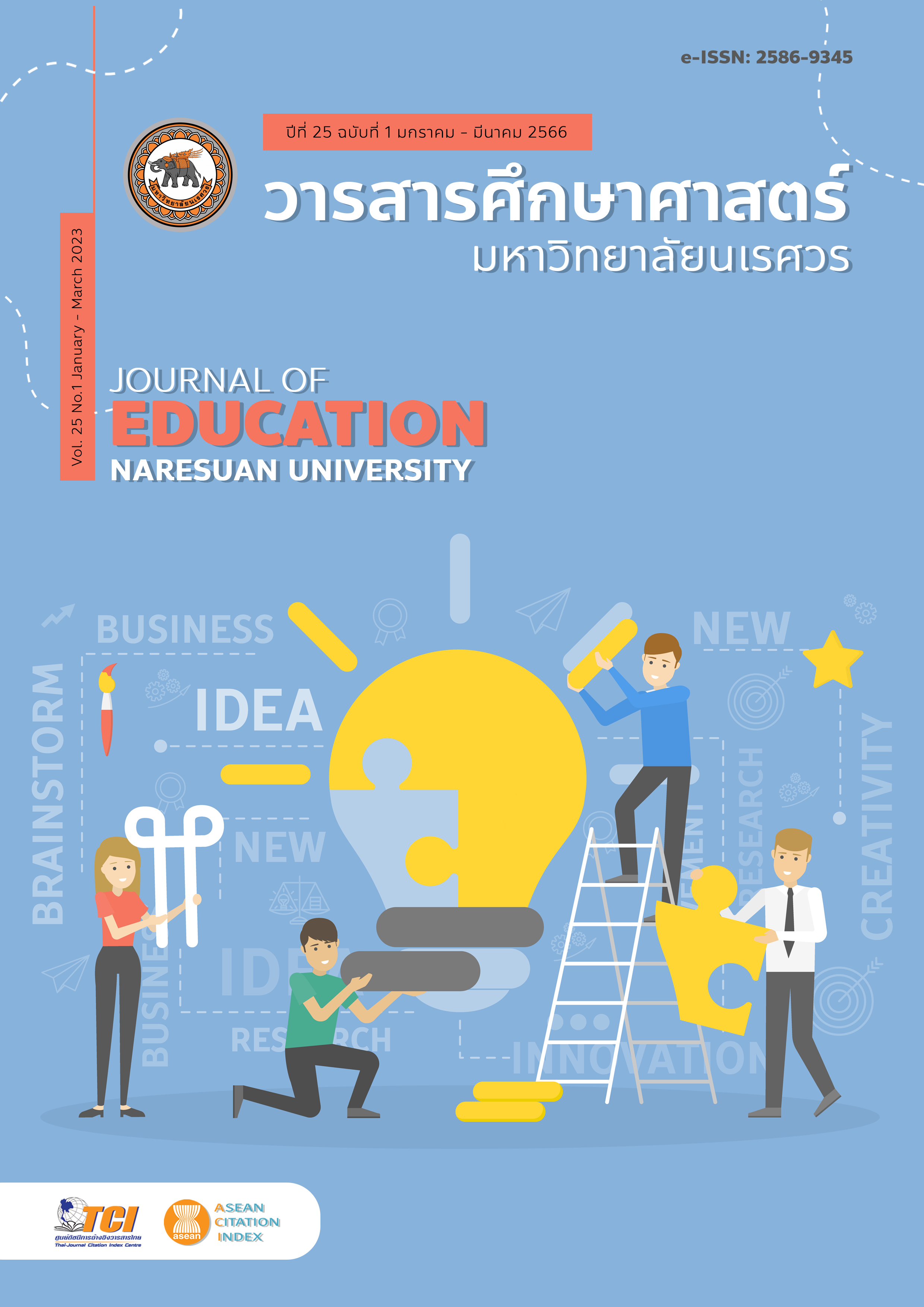THE MULTILEVEL MEDIATING EFFECT OF LEARNING ENJOYMENT IN THE RELATIONSHIP AMONG ENGAGEMENT OF SCIENCE ACTIVITY, INQUIRY-BASED LEARNING AND SCIENTIFIC LITERACY อิทธิพลส่งผ่านพหุระดับของความสนุกในการเรียนรู้ในความสัมพันธ์ระหว่างความยึดมั่นผูกพันในการทำกิจกรรมวิทยาศาสตร์ การเรียนการสอนแบบสืบสอบและการรู้เรื่องวิทยาศาสตร์
Main Article Content
Abstract
Scientific literacy is one of the competencies which is evaluated in the OECD's programme for international student assessment. This research aimed to investigate the direct and indirect effects of engagement of science activity and inquiry-based learning on scientific literacy that learning enjoyment as mediating variables in the multilevel model. This study focused on 8,249 students in Thailand by using secondary data from PISA 2015 database and analyzed by multilevel structural equation modeling (MSEM) with MPLUS. The main results revealed that this multilevel scientific literacy model fit very well with empirical data (χ2 (10, N = 8249) = 47.663, p < .001, RMSEA = .021, SRMRw = .007, SRMRb = .008). In school level, the effect of learning enjoyment on scientific literacy was high. Furthermore, learning enjoyment was a full mediator in the effect of engagement of science activity on scientific literacy. However, learning enjoyment was not a mediator in the effect of inquiry-based learning on scientific literacy.
Article Details

This work is licensed under a Creative Commons Attribution-NonCommercial-NoDerivatives 4.0 International License.
The owner of the article does not copy or violate any of its copyright. If any copyright infringement occurs or prosecution, in any case, the Editorial Board is not involved in all the rights to the owner of the article to be performed.
References
Ainley, M., & Ainley, J. (2011). Student engagement with science in early adolescence: The contribution of enjoyment to students’ continuing interest in learning about science. Psychology, 36(1), 4-12. https://doi.org/10.1016/j.cedpsych.2010.08.001
Benjaphalaporn, K., Chanunan, S., & Klamtet, J. (2018). An action research for enhancing scientific literacy by using problem-based learning on stoichiometry for 10th grade students. Journal of Education Naresuan University, 22(3), 12-24. [in Thai]
Dachakupt, P., & Yindeesuk, P. (2014). The 21st century teaching and learning. Bangkok: Chulalongkorn University Press. [in Thai]
DiCarlo, S. E. (2009). Too much content, not enough thinking, and too little fun! Advances in Physiology Education, 33, 257-264.
Gormally, C., Brickman, P., Hallar, B., & Armstrong, N. (2011). Lessons learned about implementing an inquiry-based curriculum in a college biology laboratory classroom. Journal of College Science Teaching, 40(3), 45-51.
Hair, J. F., Black, W. C., Babin, B. J., & Anderson, R. E. (2010). Multivariate data analysis (7th ed.). New Jersey: Pearson Prentice Hall.
Hampden-Thompson, G., & Bennett, J. (2011). Science teaching and learning activities and students' engagement in science. International Journal of Science Education, 35(8), 1325-1343. https://doi.org/10.1080/09500693.2011.608093
Hinkle, D. E., Wiersma, W., & Jurs, S. G. (2003). Applied statistics for the behavioral sciences. Boston, Mass: Houghton Mifflin.
Hwang, G. J., Wu, P. H., Zhuang Y. Y., & Huang, Y. M. (2011). Effects of the inquiry-based mobile learning model on the cognitive load and learning achievement of students. Interactive Learning Environments, 21(4), 338-354.
Khemmani, T. (2008). Teaching’s philosophy: Knowledge for effective teaching (7th ed.). Bangkok: Chulalongkorn University Press. [in Thai]
Litmanen, T., Lonku, K., Inkinen, M., Lipponen, L., & Hakkarainen, K. (2012). Capturing teacher students’ emotional experiences in context: does inquiry-based learning make a difference? Instructional Science, 40, 1083-1101. https://doi.org/10.1007/s11251-011-9203-4
Maxwell, D. O., Lambeth, D. T., & Cox, J. T. (2015). Effects of using inquiry-based learning on science achievement for fifth-grade students. Asia-Pacific Forum on Science Learning and Teaching, 16(1), 21-51.
Mo, Y., Singh, K., & Chang, M. (2013). Opportunity to learn and student engagement: A HLM study on eighth grade science achievement. Educational Research for Policy and Practice, 12, 3-19. https://doi.org/10.1007/s10671-011-9126-5
Murphy, C., Beggs, J., Carlisle, K., & Greenwood, J. (2007). Students as ‘catalysts’ in the classroom: The impact of co-teaching between science student teachers and primary classroom teachers on children's enjoyment and learning of science. International Journal of Science Education, 26(8), 1023-1035.
Organisation for Economic Co-operation and Development (OECD). (2017). PISA 2015 technical report. Paris: Organisation for Economic Co-operation and Development.
Pasana, M., & Nuangchalerm, P. (2010). Learning outcomes of project-based and inquiry-based learning Activities. Journal of Social Science, 6(2), 252-255.
Seyed, A. H., Nader, K., Fateh, H., & Bashir, M. (2019). The effect of inquiry-based learning method on achievement emotions of elementary students in science course. Training & Learning Researches (Daneshvar Raftar), 16(1), 51-64.
The Institute for the Promotion of Teaching Science and Technology. (2016). PISA 2015 student assessment Framework. Bangkok: Advance Printing Publisher. [in Thai]


